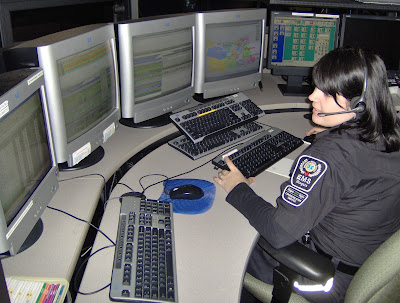 |
| (source) |
Tom Pagano: I imagine there was a lot of communication that you did with the emergency managers, and then they had to communicate a lot with each other. Do you have any ideas for what makes a good, clear, effective message when you’re communicating?
Kristy Chandler: One of the really important things to do is to have a generic email address that’s not Joe.Blow@fire.com. It’s better to have emergency@fire.com so that it’s a dedicated emergency line that people communicate to in any kind of situation. It should be on a highly secure system that’s been assessed for all kinds of risk. You should make sure it’s capable of receiving attachments of different sizes and doesn’t screen out because it’s got a firewall that’s too high.
There needs to be a secondary system in place if that was to go down. There should be another way of doing that communication, and that that needs to not only be in your plan, but it’s communicated to all of the people that may wish to contact you.
Tom Pagano: And then the actual message itself?
Kristy Chandler: Well, it’s difficult because there’s codes that all emergency responders use. Sticking to the published/industry standard codes is useful because in different areas they will have their own codes that they like to use. If you stick to a published standard then that’s useful, and using as much plain language as possible.
 |
| The fifth keyboard is being used as a foot pedal (source) |
This is much like how they say “code blue” in hospitals as shorthand for when someone in cardiac arrest and is in need of care, urgently. Frustratingly, different hospitals have different codes. “Code black” means severe weather in Chicago, someone’s being attacked in Australia or there’s a bomb threat in Wyoming. Imagine if you shouted “code white” and the local nurses clamored for the rubber hoses and the visiting nurses went for a smoke break. Clearly everyone wants to be using the same standard, but it can be tricky getting people to give up what they know to learn something new.
Tom Pagano: Is there negotiation that goes on between [emergency mangers?] Is it just, “I’ve detected something. I’d like to pass it on to the people that need to know”, or is it [more like “we should be putting more people down in district X”]?
Kristy Chandler: Negotiation does happen in these cross-agency meetings. They do that face to face, and it really depends on peoples’ personalities…
Tom Pagano: I wonder about how you keep personality out of this? Sure, there are good things about having intuition and charisma… but then there’s the other side of it.
Kristy Chandler: [Laughing] I don’t think there’s any Hollywood movie that hasn’t had some charismatic, gutsy, yelling-at-his-boss hero in an emergency situation.
Tom Pagano: “We need to get those helicopters in the air right now!”
Kristy Chandler: Whether or not the gutsy rebel hero is the one that would actually be beneficial or whether that’s just a Hollywood myth is something that’s interesting to look into.
But one of the things that we’ve noticed in this exercise is that during normal operational work, the people in these roles and doing these jobs (the ministers and their support staff) can operate in a risk adverse way - to avoid a bad political situation.
In emergency situations these people are expected to just switch and turn into Rambo and become people who can take risks. They have to make decisions with potentially limited information. And it’s a challenge. Some people just aren’t used to switching within the time scales that are required. The behavior and dynamics of these things is very, very interesting…
 |
| A flagrant violation of parlimentary procedure (source) |
Kristy Chandler: I personally am a very detailed planner who is very willing to then change the plan. [Laughing] I like to know that I’ve thought about things and that I’m not doing anything too ridiculous. But I’m very adaptable and willing to change that plan if things aren’t going well.
Thanks Kristy! Take a code white and we’ll see you again soon.
No comments:
Post a Comment